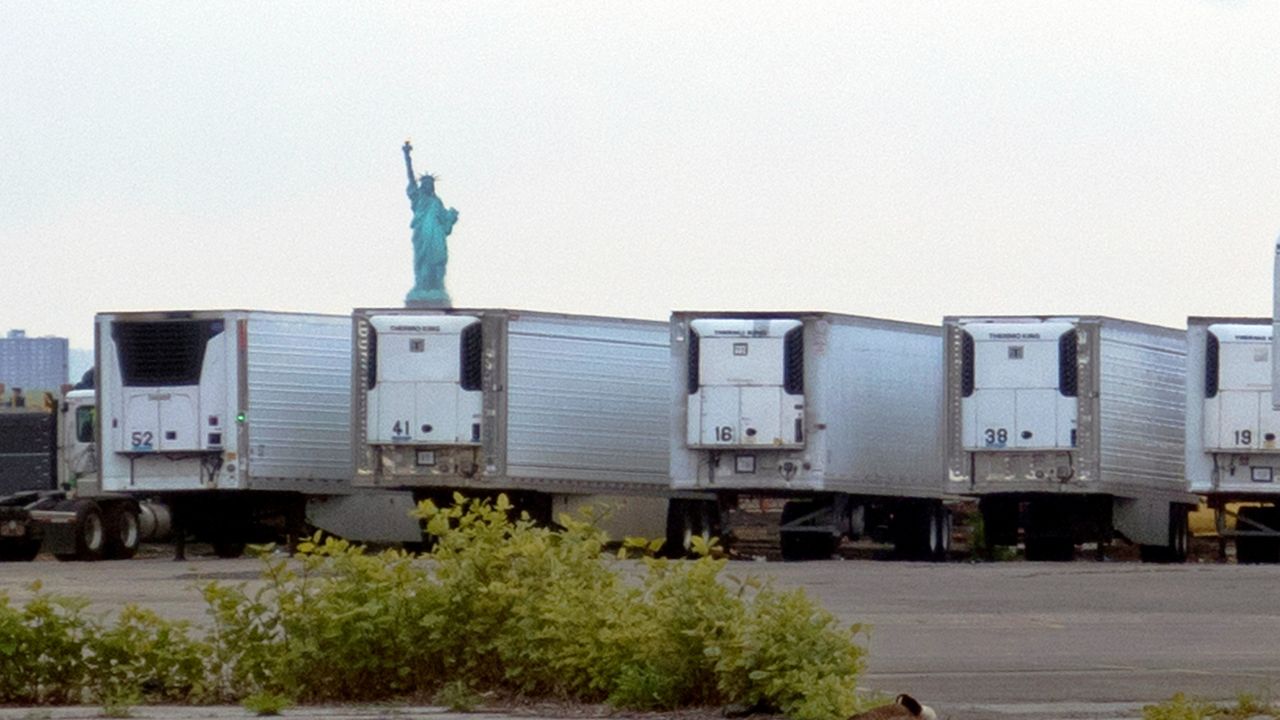More than a year since trucks arrived at the 39th Street Pier in Brooklyn storing hundreds of bodies of COVID-19 victims, elected officials and nearby residents are demanding answers.
Councilman Carlos Menchaca, whose district includes the Brooklyn neighborhood of Sunset Park, criticized the lack of communication from the city.
“It was a surprise to hear that there are still remains in Sunset Park at the 39th Street Pier,” Menchaca said. “I think that the city has failed with communication and we've made that clear.”
In a City Council hearing last week on the status of Hart Island — the city’s only public burial grounds — an official from the medical examiner’s office revealed that 750 bodies were still being stored on the waterfront in makeshift morgues after the trucks first started arriving in April of last year.
“This is a temporary facility and it was established specifically to give families that additional time during a very stressed period for the funeral industry, give them additional time to make arrangements,” said Dina Maniotis, executive deputy commissioner for the Office of the Medical Examiner.
Maniotis did not provide a concrete timetable, but, instead, said the families “would be notified shortly” and that the bodies would eventually be transferred to Hart Island.
“We have and we will continue to reduce the size of the long-term mortuary operations to meet the need as appropriate so that number is getting smaller and it will continue to get smaller,” she said.
The Office of Chief Medical Examiner did not comment on the status of the facilities, the timetable to ramp down operations and how the bodies will be transferred.
Elected officials such as Menchaca and community members took issue with what they perceive as a less than compassionate approach to getting the hundreds of deceased to their final resting place.
“Some families need more time and we get that,” said Menchaca. “We want to make sure that the city is constantly moving with dignity, but we also want to make sure that the city is communicating all of this with a neighborhood that has been impacted, a neighborhood that has seen what they've seen.”
The ZIP code that includes Sunset Park, a neighborhood that’s largely Latino and Asian, had one of the highest rate of positive cases in Brooklyn in early April 2021.
Tony Giordano, an advocate with the Sunset Park Restoration community group, started an online petition demanding immediate action from the city and stepped up to serve as “family members” of the deceased.
“We, the people of Sunset Park, are stepping forward as their family,” the petition reads. “We will not let them be forgotten and disrespected.”
“Basically, we're claiming the bodies,” said Giordano, who has lived in the neighborhood for about 60 years. “We're saying that these bodies, we’re family. We'll accept the responsibility for these bodies and that doesn't mean anything legally, but emotionally it does. It shows that this is our fellow human beings and we can't stand by quietly.”
For many, the priority is ensuring that the bodies are treated with dignity and compassion. But there’s also concerns over the environmental impact of these large storage containers.
“Is there any concern for the effect on the air?” Giordano said. “Because 24 hours a day these units are going and Sunset Park is known for people that have respiratory ailments.”
Sunset Park has been cited as a neighborhood disproportionately affected by environmental degradation. A combination of industrial pollution from nearby factories and the heavily trafficked Gowanus Expressway have led environmental justice advocates to organize in the area.
So far, about 50 people have signed the petition.
Instead of rallies or protests, Giordano plans on “getting in the way of some of our elected officials.”
“Maybe embarrassing them and pushing them to step up,” he said. “And being an election year with the City Council, this is a good time to do that kind of pushing.”



